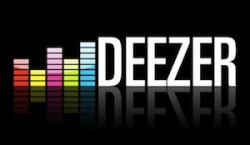Music streaming may not be making much money right now, but that’s not stopping music streaming hopefuls from trying. The latest development comes from Deezer, which is announcing a series of new services based around its APIs to drive more users to its service. They include an affiliate marketing program; more social and gaming integration; and the ability to port apps made for the Deezer App Studio into Deezer’s mobile apps for Android and iOS devices. This last point gives Deezer a leg up on Spotify, which has yet to incorporate third-party apps into its mobile platform — although we spotted a while ago that Spotify seems to have laid the groundwork for this already.
Deezer says it currently has 26 million customers, with some 3 million of them paying as of January 2013. As a point of comparison, Spotify now has 24 million subscribers, 6 million of them paying. But with Spotify’s service reaching 26 countries and Deezer’s, via its web app, 180 (its developer site lists 215 live countries), it’s clear that Deezer has a long way to go to keep up with Spotify’s rate of penetration.
And as we mentioned yesterday in a story about Rdio expanding its geographical footprint, competition is only going to get tougher as Spotify gears up to launch its web-based version and continue its gradual build-out in other ways. “Right now,” Spotify Chief Marketing Officer Jeff Levick told Cnet, “all the conversations we have are about how do we accelerate this business.”
Today’s upgrades are part of Deezer’s bigger push to make itself more attractive by differentiating on services, with the belief that competing on a basic music streaming service or landgrab not enough in today’s market. This is a theme that CEO Axel Dauchez has been pushing for some time now, going back to the company’s $130 million fundraise in October 2012, through to a keynote in February at the Mobile World Congress, and again today:
“Music streaming isn’t about giving people access to soulless databases of songs,” he said in a statement. “We want to build an immersive and entertaining experience that gets people hooked on Deezer. Our affiliate scheme and API improvements will help developers seamlessly bring music into their greatest apps. We can’t wait to see what they’ll build.”
The affiliate program, Deezer says, is accessible through its Open API (first launched in May last year), and it’s essentially an incentive to developers not only to use Deezer’s API for any music needs in their apps, but also to make a point of promoting it. Deezer says that each time a user subscribes to Deezer via these apps, the developer gets a payment equivalent to a month-long Deezer subscription, priced at the local equivalent of £9.99. (As with Spotify and Rdio, the other usage tier is priced at £4.99.)
Meanwhile, the updates to the API are also adding in more functionality. They include more social integration including an appearance on the social bar in Deezer’s main app. And Deezer is trying out a new twist on where the music may get used by adding features “to enable and encourage the development of gaming experiences.” To give an idea of how this would work, Deezer has also developed a Songpop-style gaming app, Askking Music, “an app which combines gaming with music discovery. People using Askking Music can challenge their Deezer contacts and Facebook friends to identify tracks from shared favourites and playlists.”
Deezer is also adding more apps to its third party App Studio (the equivalent of Spotify’s App Center), a dating app called Moosify and music discovery app Seevl, taking the total to 35 added in the last six months.
While Deezer has yet to go live in the U.S. — currently Spotify’s biggest market, and perhaps the biggest and most mature market for streamed music overall — it is passing its competitor in another piece of functionality by making its apps available on mobile, specifically making all apps in the App Studio available via Deezer’s apps for all iOS and Android devices. Mobile is one of the key drivers of usage for Spotify — specifically for paid subscribers — so Deezer is hoping that by making its mobile service more attractive, it will see the same effect.
The idea, too, is that this greater ubiquity will make Deezer a more attractive platform for developers. But as with all consumer services, they’re often only as successful as the number of people using them, so the big question will be whether third party apps on mobile, social integration, gaming, and prominent Deezer promotions will be enough to stand above the rest.
